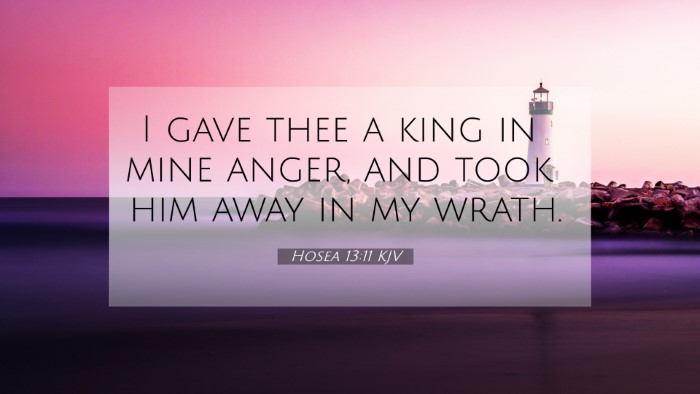Old Testament
Genesis Exodus Leviticus Numbers Deuteronomy Joshua Judges Ruth 1 Samuel 2 Samuel 1 Kings 2 Kings 1 Chronicles 2 Chronicles Ezra Nehemiah Esther Job Psalms Proverbs Ecclesiastes Song of Solomon Isaiah Jeremiah Lamentations Ezekiel Daniel Hosea Joel Amos Obadiah Jonah Micah Nahum Habakkuk Zephaniah Haggai Zechariah MalachiHosea 13:11 Similar Verses
Hosea 13:11 Cross References
I gave thee a king in mine anger, and took him away in my wrath.
Uncover the Rich Themes and Topics of This Bible Verse
Listed below are the Bible themes associated with Hosea 13:11. We invite you to explore each theme to gain deeper insights into the Scriptures.
Hosea 13:11 Cross Reference Verses
This section features a detailed cross-reference designed to enrich your understanding of the Scriptures. Below, you will find carefully selected verses that echo the themes and teachings related to Hosea 13:11 KJV. Click on any image to explore detailed analyses of related Bible verses and uncover deeper theological insights.

1 Samuel 10:19 (KJV) »
And ye have this day rejected your God, who himself saved you out of all your adversities and your tribulations; and ye have said unto him, Nay, but set a king over us. Now therefore present yourselves before the LORD by your tribes, and by your thousands.

1 Samuel 31:1 (KJV) »
Now the Philistines fought against Israel: and the men of Israel fled from before the Philistines, and fell down slain in mount Gilboa.

Proverbs 28:2 (KJV) »
For the transgression of a land many are the princes thereof: but by a man of understanding and knowledge the state thereof shall be prolonged.
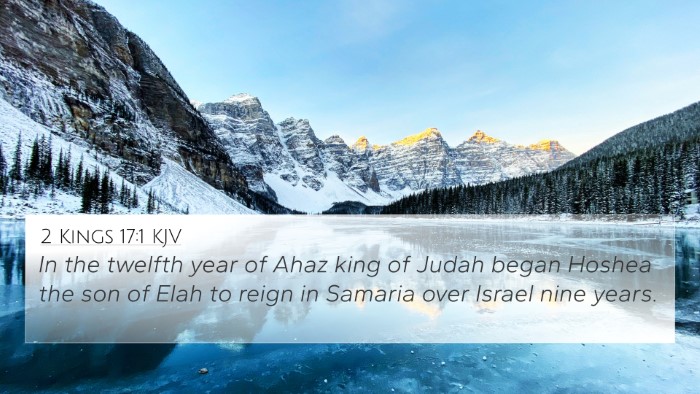
2 Kings 17:1 (KJV) »
In the twelfth year of Ahaz king of Judah began Hoshea the son of Elah to reign in Samaria over Israel nine years.

1 Kings 12:26 (KJV) »
And Jeroboam said in his heart, Now shall the kingdom return to the house of David:
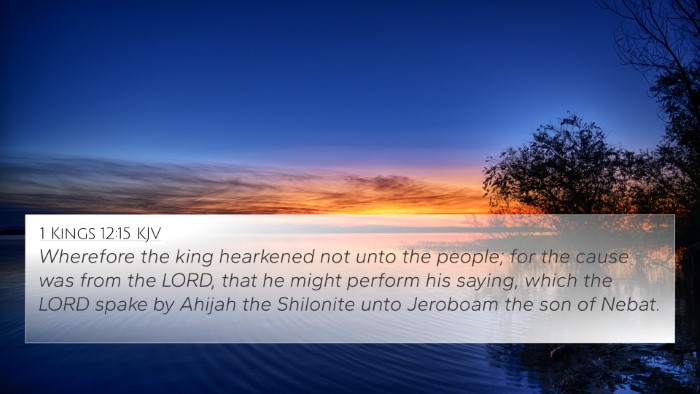
1 Kings 12:15 (KJV) »
Wherefore the king hearkened not unto the people; for the cause was from the LORD, that he might perform his saying, which the LORD spake by Ahijah the Shilonite unto Jeroboam the son of Nebat.
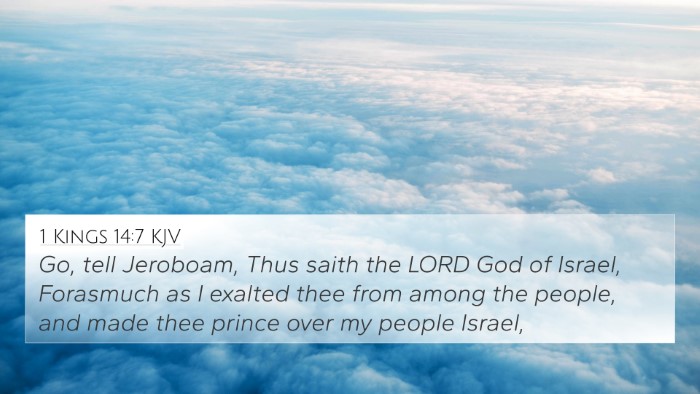
1 Kings 14:7 (KJV) »
Go, tell Jeroboam, Thus saith the LORD God of Israel, Forasmuch as I exalted thee from among the people, and made thee prince over my people Israel,
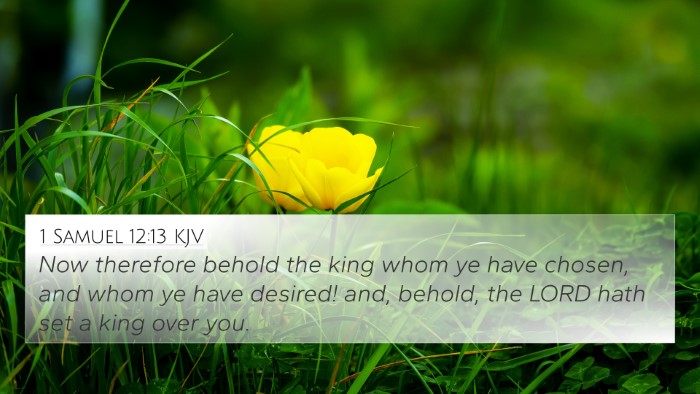
1 Samuel 12:13 (KJV) »
Now therefore behold the king whom ye have chosen, and whom ye have desired! and, behold, the LORD hath set a king over you.
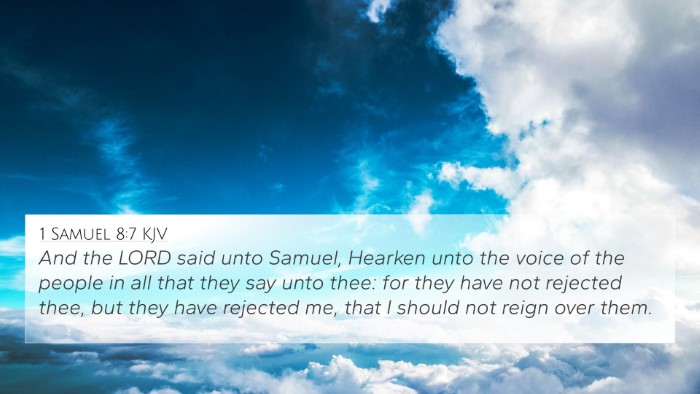
1 Samuel 8:7 (KJV) »
And the LORD said unto Samuel, Hearken unto the voice of the people in all that they say unto thee: for they have not rejected thee, but they have rejected me, that I should not reign over them.
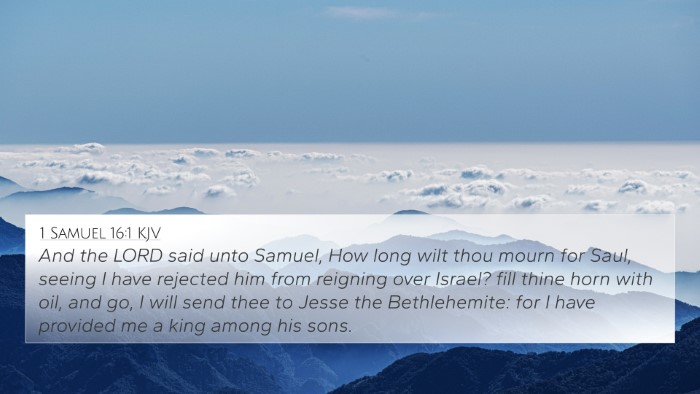
1 Samuel 16:1 (KJV) »
And the LORD said unto Samuel, How long wilt thou mourn for Saul, seeing I have rejected him from reigning over Israel? fill thine horn with oil, and go, I will send thee to Jesse the Bethlehemite: for I have provided me a king among his sons.
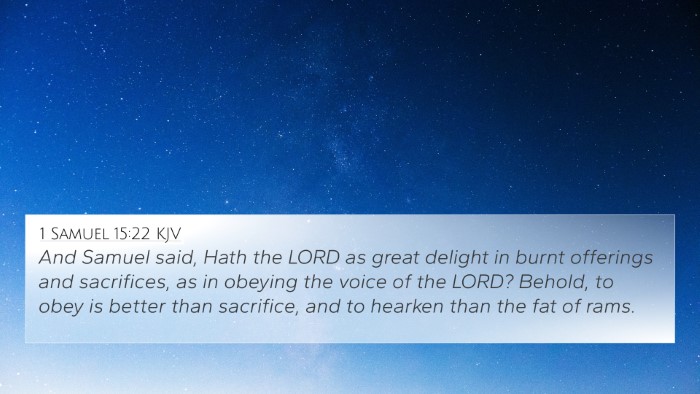
1 Samuel 15:22 (KJV) »
And Samuel said, Hath the LORD as great delight in burnt offerings and sacrifices, as in obeying the voice of the LORD? Behold, to obey is better than sacrifice, and to hearken than the fat of rams.
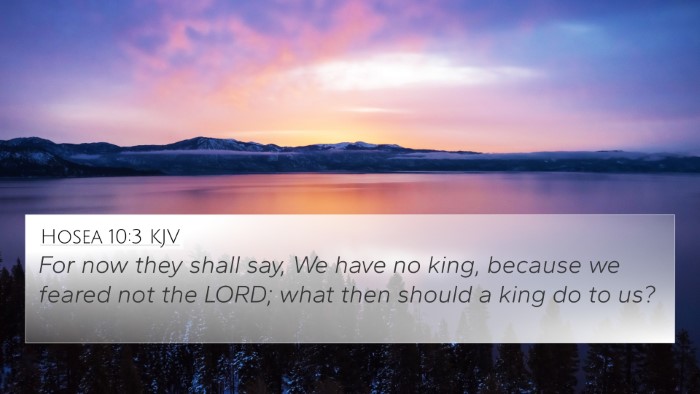
Hosea 10:3 (KJV) »
For now they shall say, We have no king, because we feared not the LORD; what then should a king do to us?
Hosea 13:11 Verse Analysis and Similar Verses
Understanding Hosea 13:11
Hosea 13:11 states: "I gave thee a king in mine anger, and took him away in my wrath." This verse reveals God’s discontent and judgment towards Israel for its pursuit of kingship and governance apart from divine counsel.
Contextual Analysis
The Book of Hosea is a poignant work that addresses the theme of unfaithfulness and the consequences that arise from it. The prophet Hosea symbolizes God's love for Israel, despite their continual infidelity. Hosea 13:11 captures a moment of divine disappointment, where God reflects on His decision to grant Israel a king, illustrating both His authority and the repercussions of disobedience.
Key Insights from Commentaries:
-
Matthew Henry:
Henry emphasizes that this verse serves as a reminder of God's sovereign choices. He provides insight into the notion that God's gifts, such as kingship, can become the source of judgment when misused. God’s wrath was provoked not just by Israel’s demands for a ruler but by their rejection of His kingship.
-
Albert Barnes:
Barnes highlights that Israel's desire for a human king reflects their sinful nature and lack of trust in God. The taking away of the king symbolizes the divine judgment wherein God removes the blessings He once bestowed upon disobedient nations. This offers profound clarity on the divine-human relationship marked by trust and infidelity.
-
Adam Clarke:
Clarke articulates that this verse signifies a declarative moment where God articulates His discontent in giving Israel a king due to their persistent rebellion. He explains the broader narrative of how Israel’s rejection led to their troubles, serving as a cautionary tale about the importance of aligning with God's will.
Thematic Connections
This verse connects with several significant biblical themes, urging readers to contemplate the implications of leadership, divine sovereignty, and judgment. It resonates with the overarching narratives within scripture where leaders shaped nations, sometimes leading them away from God.
Cross-References:
Hosea 13:11 is vividly interconnected with various scripture passages:
- 1 Samuel 8:7-9 - Reveals Israel's desire for a king, reflecting their rejection of the Lord.
- Hosea 10:3 - Discusses the desolation Israel faces due to abandoning God.
- Jeremiah 23:1-4 - Speaks of God's condemnation of unfaithful leaders.
- Psalm 106:15 - Shows God's response to the people’s demands, giving them what they desired but with adverse results.
- Isaiah 1:19-20 - Highlights the obedience needed from God's people to receive the blessings of leadership.
- 1 Kings 9:7-9 - Discusses God’s warning against disobedience and the consequences that follow.
- 2 Chronicles 36:16 - Describes how disregarding the prophets leads to destruction, echoing the sentiments in Hosea.
Conclusion and Reflection
Hosea 13:11 serves as a sobering reminder of the importance of aligning human leadership with God's will. This teaching echoes throughout scriptural history, emphasizing the reciprocal relationship between divine provision and human obedience.
By understanding Hosea 13:11 in light of cross-references and themes, believers can better grasp the nuances of God's intentions and the patriarchal framework laid out throughout the Bible.
Further Study Suggestions
For those interested in deepening their understanding, tools for Bible cross-referencing such as a Bible concordance or a cross-reference Bible study guide can be invaluable. These resources enhance one's ability to explore connections between Biblical texts and identify thematic Bible verse connections effectively.
Engaging with scripture through cross-referencing can reveal layers of meaning within the Word, guiding readers toward a more profound comprehension of interconnected verses, such as the implications seen across the prophetic teachings.


